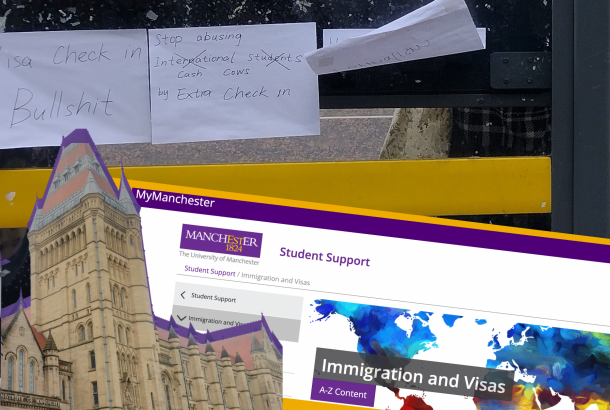UoM staff expenses plummet during pandemic

Words by Vicky Haines
A Mancunion investigation has revealed that hospitality expenses spending via University of Manchester staff credit cards totalled just £150 in December 2020, compared to £22,000 in December 2019.
For the past few years, The Mancunion has conducted an annual investigation into University credit and purchasing card expenses – using data collected through Freedom of Information requests – which has historically revealed some unusual results.
According to the University’s General Guidance for staff procurement, University expenditure must:
• support the University’s aims and objectives;
• comply with any necessary legislative requirements;
• demonstrate to stakeholders that controls over spending are adequate;
• deliver value for money.
Despite this, certain controversial University staff expenses in past years have included £5000 spent on two visits to a steak restaurant in New York in 2018 and a meal at the infamous American ‘breastaurant’, Hooters, in 2019.

But, after 18 months in lockdown, this year’s Mancunion investigation has revealed a drastic reduction in staff card spending in the hospitality sector, particularly when comparing December 2019 and 2020.
In the month of December 2019, University procurement cards covered almost £22,000 worth of meals and drinks out, compared to just £150 in December 2020.
Data from 2019 shows that a sizeable chunk of staff expense spending pre-pandemic went to pubs and restaurants, the things we have missed the most during the national lockdowns. Some clear favourites for UoM staff included BrewDog, at which £1770 was spent in December 2019, and almost £5000 in pubs owned by the Stonegate Group, which includes the brands Slug and Lettuce, Yates, and Walkabout, to name just a few.
Increased spending during the festive season on Christmas dos and restaurants has been a common occurrence for the University in previous years, and is a common occurrence in corporate culture as a whole, with around £1bn spent across the UK on company Christmas parties in 2015. However, the almost non-existent hospitality spending during the pandemic appears to be both a direct result of the national lockdown and a University-wide tightening of belts in reaction to major investments in online teaching and a drastic drop in University income from student rent and commercial services.
960 miles of Uber journeys were claimed on University expenses in 2019 – roughly equivalent to driving from Manchester to Milan.
Another big cost for the University was money on travel, transport, and accommodation, stacking up to an impressive £15,500 in the 2019 festive period alone. This money was spent on international travel, hotel visits, and cross-country train journeys.
The data shows that University staff had a firm favourite in terms of ways to commute around the city. In the month of December 2019, there were 960 miles worth of Uber trips paid for by the University, which is roughly the driving distance from Manchester to Milan.
Spending on leisure and transport was next to nothing the following December as we were in the midst of a lockdown, despite a few takeaway pizzas still making an appearance.
During the past academic year, the University issued a ‘Coronavirus Buying Update’ saying “Only essential services and supplies are to be purchased until further notice”. Travel was also “restricted to essential trips only.”
More infamous company expense spending includes the brand Under Armour, which was criticized in 2018 for “being run like a frat house” with staff regularly expensing limousine rides, gambling, and trips to strip clubs.
On the other hand, a well-crafted staff expense policy and benefits can do wonders for a company, such as in the case of Netflix, who made company-wide savings but implementing an expense policy based on personal responsibility which is just five words long: “Act in Netflix’s best interests.”
Generous company benefits and expense policies can also be key to attracting employees and increasing staff satisfaction and wellbeing. Starbucks, for example, offers staff complete tuition fee coverage for an online bachelor’s degree of your choice at Arizona State University. The coffee company also has a forward-thinking health insurance plan which includes “not only gender reassignment surgery (which had been covered since 2012), but now also a host of procedures for staff in the U.S. that were previously considered cosmetic, and therefore not covered, such as breast reduction or augmentation surgery, facial feminization, hair transplants and more.”

Despite the potential benefits of staff expense spending, the fact that the University is capable of spending £22,000 in one month on hospitality has raised some eyebrows within the student body. Students in recent years have faced annual tuition fees of £9000 and upwards, but many have complained that they do not feel they are receiving value for money.
Months of online teaching, several lecturer strikes, cuts to modules and cuts to academic staff are just some of the things UoM students have faced in the past 5 years.
What’s more, £22,000 equates to almost £4000 more than the annual salary of a University teaching assistant.
The major drop in staff hospitality spending of the past year has led some students to question whether it is really a necessary part of university life. A first year University of Manchester student said she did not “understand why this level of spending was necessary, as it doesn’t seem to be directly benefiting student progress or staff research”.
English Literature student Celia Hounsell felt that this reduction in staff expense spending should have been reflected through tuition fees as she felt “the teaching received this year was not at all worth what we paid”. She called for reduced expenses spending, and an alleged poorer student experience to be “rectified through refunds or different allocation of funds to benefit students directly”.
When contacted for comment, a University of Manchester spokesperson said:
“We understand this has been an unprecedented and challenging year for students. That is why we have invested millions of pounds into additional support measures and teaching and learning.
“For example, implementing and delivering our extensive online learning programme throughout the pandemic has actually cost more than traditional teaching. There was also extra spend on everything from improved mental health provision – like our 24-hour support line and app – to additional student financial aid.“
“There are times when using corporate credit cards is the most efficient way to purchase goods and services. The University has a transparent, robust and proportional expenses system in place for all our staff, no matter their level.
“The claims outlined have all been approved and verified for a range of legitimate business-related purposes, such as travel, emergencies, attending and hosting academic conferences and events, student teaching and learning, outreach work, and carrying out and promoting our institution’s research.
“Each cost is subject to individual approval and our expenditure is reviewed to ensure money is spent efficiently. This enables us to make these strategic investments into priorities such as student support and teaching.”
Expense spending on University procurement cards in December 2020 was worlds away from that of the previous year. But with the student body’s return to campus fast approaching, it remains to be seen whether staff will also return to their former spending habits in the coming academic year. The major drop of the past year could raise the question of whether this sort of spending on staff meals out is necessary for the University to function.
This is the second article in a three-part expenses series. The first part revealed UoM spent £250,000 on Amazon in 2020.







